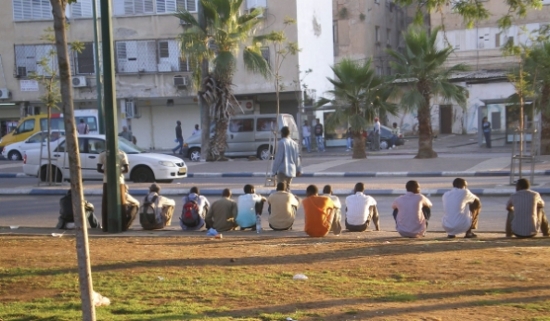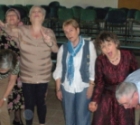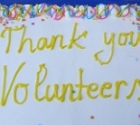
Recently the issue of refugees and asylum seekers, and particularly those in South Tel Aviv, has been in the news - and not in a good way. A selection of recent articles alternatively portrays them as labor infiltrators,[1] criminals and rapists,[2] or burdens on society. Rhetoric on the national level seems to be matched with antagonism on the ground.[3] Over two separate incidents, Molotov cocktails - intentionally or not - were thrown towards apartments housing refugees.[4] While these failed to cause any bodily injury, there is no doubt that they have created an atmosphere of fear in an already terrorized population.[5] This article will move behind the rhetoric to explore what is actually happening on the ground.
Today in Israel there are over 50,000 asylum seekers. Over 50% of these are from Eritrea, with the next largest groups being from Sudan (Darfur, South Sudan and increasingly, the Nuba Mountains region). Others are from countries such as the Ivory Coast, Congo and Somalia. None of them choose to come to Israel - circumstances force them in this direction. Those from Eritrea are fleeing an extremely repressive regime which can see them serving in the army upwards of 20 years. Darfurians have escaped genocide, while South Sudan, the world’s newest nation, is on the cusp of renewing its 20-year civil war with the Arab regime in Khartoum. “Fortress Europe” is largely closed to them as an option, especially since Italy and Libya signed an agreement in 2007 mandating the return of persons moving in that direction. In Egypt, they can’t walk the streets alone for fear of bodily injury. Even frequent deaths at the hands of Egyptian troops[6] and torture camps[7] in the Sinai dessert haven’t deterred them from seeking safety in our small corner of the world.
Once in Israel, after being picked up by soldiers patrolling the border, their first stop is in Ketziot prison. Due to lack of space, they are usually released after two to three weeks. Their next stop, almost without exception, is Israel’s ‘Ellis Island’ for migrants - the Central Bus Station in Tel Aviv. At this point, they find themselves with nothing but the clothes on their back - and sometimes only prison-issued flip flops and gunshot wounds from the border – in Israel. For people who, for the most part, lack education and fluency in Hebrew and English, this can be confusing at best. While new arrivals will tell you that they like Israel, it soon dawns on them that appearances are deceptive.
Israel has signed the 1951 Convention on refugees and was even one of its primary framers. While in other Western countries, the vast majority of people from Sudan and Eritrea are granted refugee status, in Israel they are given a kind of “collective protection” which protects them from deportation but does not grant them any benefits. Upon verifying their country of citizenship in prison, they are released with a “conditional release” document (2alef5 visa). While this document gives them permission to be outside of prison – as long as they cooperate with the terms of their deportation – since 2010 it also says “This is not a work permit”.[8] In addition to not being granted work permits, they are not able to access any social benefits such as health care through the national health system, as are recognized refugees. Consequently, on the technical and legal level, their situation is akin to being in any one of the countries they are attempting to flee: Egypt, Chad and Libya.
The relatively large numbers of asylum seekers and the lack of work permits is a humanitarian crisis waiting to happen. While in previous periods asylum seekers still managed to find work (usually low-paying jobs such as dishwashing), employers willing to hire people without work permits have, for the most part, already found people. The work available today is shorter term (what asylum seekers call “avodah chick chak”) or the pay and conditions are worse. And thousands every day are not able to find work at all. This leaves them with lots of time on their hands and no money, in an area characterized by crime and drug abuse. Arguably even worse is that this leaves young men – virtually all of whom have endured some form of trauma – time to think about their suffering and unable to earn an honorable living for themselves or the families they have left behind. In my view, this is a recipe for disaster.
Their relatively dire situation is only compounded by a lack of basic services; food, shelter and healthcare. Where the government has dropped the ball (with the arguable exception of the city of Tel Aviv), NGOs and private initiatives have stepped in to fill the void. Hundreds of people sleep outside in the park each night. A shelter for men operated for four months, while the African Refugees Development Center runs a small shelter for women and children. Breakfast is provided by a private individual, in cooperation with restaurants and stores who provide leftover food and with the support of the Good People Fund. Dinner is provided by Marak Levinsky. The government runs a small and poorly equipped clinic in the central bus station while more extensive healthcare is provided by the Open Clinic run by Physicians for Human Rights (PHR). PHR and other NGOs such as Kav LaOved and the Hotline for Migrant Workers, while assisting individuals in areas such as workers’ rights and rights in detention, tend to be more focused on advocacy. This is with the knowledge that the need is much greater than their ability to provide for it, and consistent with the belief that they should not be replacing services provided by the government.
Given the current direction of events on the ground, the prognosis is not good. The government’s solution is to build a huge prison camp. Even with the anticipated approximately 13,000 places planned, this would still leave tens of thousands of people on the streets with no way to provide for their basic needs. Irrespective, this is not likely to deter potential arrivals who are fleeing for their lives. A more humane policy has not been proposed. In the meantime, push factors in the source countries remain the same or are only intensifying; in Sudan, the north and south are headed for war while the situation on the ground in Darfur remains the same and a new genocide is occurring in the Nuba Mountains region. In Eritrea the regime shows no signs of falling.
The increasing numbers of young black men on the ground in specific areas: south Tel Aviv, Ashdod, Eilat and Arad will likely continue to arouse antagonism and fear. Serious and concerted action needs to be taken to prevent a further deterioration of the situation.
It is important to note that Israel is not alone in facing the challenge of dealing with refugees. Across the board, the majority of western countries struggle with the same issues frequently arising here: fear of losing their unique identity, feelings of being “invaded” or “flooded” by large numbers of individuals who have a different culture and different norms, problems with integrating the poor and poorly educated into their home-societies and more. It is also important to remember that the vast majority of the refugee burden falls on poor neighboring countries such as Chad (women, children and the elderly from Darfur), Uganda (south Sudanese) and Kenya (Somalis). As long as it is not safe to deport those that are here, a limited number should be granted refugee status while the rest should be entitled to basic social benefits - and, most importantly - work permits. The option of resettlement should be more intensely pursued.
Israel, as a Jewish country, founded by people for whom persecution has been a regular occurrence and having experienced being the “stranger” and relying on the goodwill of others can and should do better.
Lisa Richlen worked at the Hotline for Migrant Workers for six and a half years, and most recently with a refugee self-help organization running a shelter for homeless refugees. She is available to give walking tours of south Tel Aviv. She can be contacted at: lmrichlen@gmail.com.
[1] http://www.ynetnews.com/articles/0,7340,L-4156766,00.html
[2] http://www.haaretz.com/news/national/israel-police-unemployed-african-refugees-turning-tel-aviv-beaches-into-high-crime-spots-1.427634
[3] http://www.haaretz.com/news/national/firebomb-attack-on-asylum-seekers-buildings-sparks-clashes-in-south-tel-aviv-1.427022
[4] http://www.haaretz.com/news/national/african-residents-in-south-tel-aviv-targeted-by-second-firebomb-attack-in-two-weeks-1.428469
[5] http://www.haaretz.com/news/national/following-attack-on-migrant-workers-israeli-aid-group-says-receives-anonymous-threat-1.428766
[6] http://www.hrw.org/reports/2008/11/12/sinai-perils-0 and http://edition.cnn.com/2011/11/02/world/meast/egypt-refugees/index.html
[7] http://www.guardian.co.uk/world/2012/feb/14/egypt-bedouin-kidnap-refugees-israel
[8] It is important to note that while it is not technically legal to employ them, the Supreme Court has ruled that employers cannot be fined for hiring them.
 Let’s have a bit of Playback
Let’s have a bit of Playback-1372659501.jpg) Buying New Construction in Israel
Buying New Construction in Israel A lot of hot air - ballooning
A lot of hot air - ballooning A new website in English - on Volunteering - Launched in Israel
A new website in English - on Volunteering - Launched in Israel Help Needed for Abused Horses and Donkeys
Help Needed for Abused Horses and Donkeys Heather's Heseg
Heather's Heseg